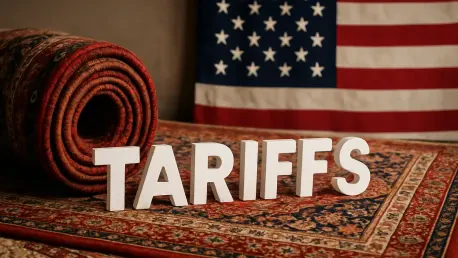Today, we’re sitting down with Donald Gainsborough, a political savant and leader in policy and legislation, who heads Government Curated. With his deep expertise in international trade and economic policy, Donald offers a unique perspective on the challenges facing developing countries like India, particularly in the wake of recent US tariffs impacting industries such as Bhadohi’s carpet sector. Our conversation explores the ripple effects of these tariffs on local businesses, workers, and communities, as well as the broader implications for India’s global market position and the livelihoods dependent on export-driven industries.
Can you walk us through how the recent US tariffs have impacted export industries like the carpet sector in Bhadohi, India?
Absolutely. The US tariffs, which have escalated to a staggering 50 percent, have essentially slammed the brakes on industries like Bhadohi’s carpet sector. This area, often called the carpet city of India, relies heavily on the US market for about 60 percent of its turnover. With such high tariffs, exporters can’t afford to ship their goods—margins are already thin, often just 8 to 10 percent. Production has halted for many, and no shipments have gone out to the US in weeks. It’s not just about lost revenue; it’s the entire supply chain, from manufacturers to weavers, grinding to a stop.
What’s the scale of dependency on the US market for a place like Bhadohi, and how has this sudden disruption affected day-to-day operations?
Bhadohi’s carpet industry is almost entirely export-driven, with negligible domestic demand. We’re talking about a $1.83 billion industry nationwide, with Bhadohi controlling over 80 percent of that. The US alone accounts for a massive chunk of their business. When tariffs hit, operations didn’t just slow down—they froze. Exporters have stopped dispatching consignments, and many are sitting on inventory they can’t move. Day-to-day, this means factories are idle, workers aren’t getting paid, and the whole ecosystem is under strain.
How are these tariffs affecting the personal lives of business owners and their families in Bhadohi?
The personal toll is heartbreaking. Business owners, some of whom have been in the trade for decades, are facing sleepless nights. They’re not just worried about profits; it’s about survival. Families are cutting back on essentials, and some are even pulling kids out of school because they can’t afford fees. The stress is palpable—there’s a real fear that if things don’t turn around soon, entire livelihoods could vanish.
What’s happening to the workers, especially the weavers, who form the backbone of this industry?
The weavers are bearing the brunt of this crisis. With orders drying up, layoffs are rampant—some estimate 100,000 have already lost jobs, and that number could climb to 700,000 in a couple of months. Many are working just a few days a week, if at all. Migration is becoming common, with workers leaving Bhadohi for other states or industries, which risks a permanent loss of skilled labor. Families are struggling to make ends meet, often unable to afford basics like education for their children.
Can you describe the broader community impact in Bhadohi right now, with the carpet industry in such a tough spot?
The mood in Bhadohi is grim. This isn’t just an industry issue; it’s a community crisis. With less money circulating, local markets and small businesses are suffering—shops are emptier, and spending has dropped significantly. There’s a mix of despair and dwindling hope. Some still believe a resolution might come, but others are starting to see this as the end of an era for the carpet trade. The entire local economy, which thrives on foreign revenue from exports, is taking a hit.
How do you think these tariffs are reshaping India’s position in the global carpet market compared to competitors like Turkey and Pakistan?
It’s a serious concern. Turkey and Pakistan face much lower tariffs—15 and 19 percent, respectively—giving them a clear edge in the US market. India risks losing significant market share if this persists. Once customers shift to competitors, winning them back is an uphill battle, especially in a price-sensitive industry like this. If no action is taken soon, Bhadohi’s exporters could see their decades-long dominance slip away, which would be devastating for the region.
There were hopes that discussions between India and the US might ease these tariffs. How do you view the outcome of those talks, and what does it mean for the industry?
Many in the industry were banking on bilateral talks between New Delhi and Washington to bring some relief, perhaps a more competitive tax rate. But nothing substantial came out of it, which has been a huge disappointment. Without a reduction in tariffs, the industry remains on life support. It’s not feasible to sustain operations under these conditions, and for many, it feels like a betrayal of the hope they held onto during months of uncertainty.
Looking ahead, what’s your forecast for the future of export industries like Bhadohi’s carpet sector if these trade tensions continue?
If these trade tensions drag on, the outlook is pretty bleak. We could see a collapse of the carpet industry in Bhadohi, with half a million or more jobs lost and irreversible damage to the local economy. Competitors will likely cement their hold on the US market, and skilled workers may never return even if tariffs are eventually lifted. On a broader scale, this could set a precedent for how trade policies disrupt developing economies, pushing them to diversify markets or face prolonged hardship. I think the next few months are critical—if there’s no intervention, we’re looking at a painful decline for an industry that’s been a cultural and economic pillar for generations.









